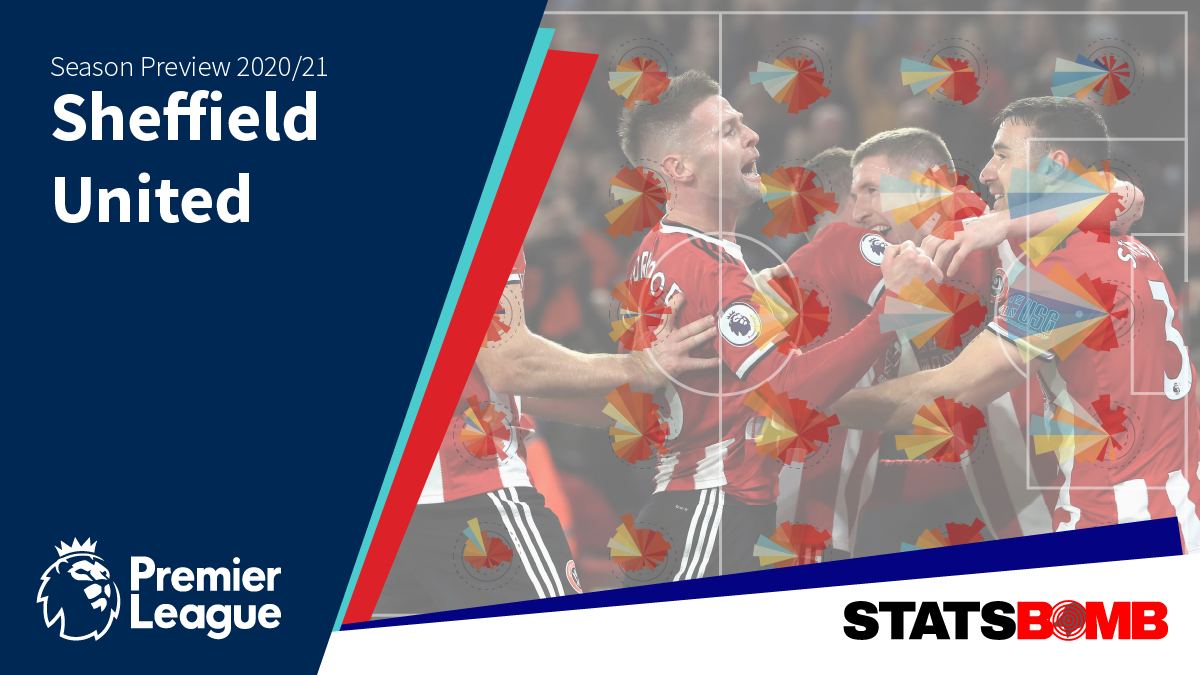It was 12 months ago that we at StatsBomb proclaimed, to many a raised eyebrow and sanity check, that this newly-promoted Sheffield United side had every capability of mounting an instant challenge for a European place. Just kidding. Of course we didn’t. Nobody did. Even the most optimistic disciples of Chris Wilder and Alan Knill’s managerial abilities - A.K.A Blades supporters - would’ve scoffed at any suggestion they were about to fall just short of a top-seven finish in their return to the top flight, and yet at the same time maybe they wouldn’t have held much disbelief after all. Another season of overachievement would only be following the trend at this point, such has been the rapid and sustained ascent under their four years of management. Only a post-lockdown dip put paid to their European hopes but a 9th placed finish in your first top flight season since 2007 on comfortably the lowest budget in the division? Fans would bite your hand off and probably take a bit of arm and torso too, though it’s easy to imagine the relentlessly ambitious Wilder curling a lip at the idea of a late season dip in form, despite acknowledging prior to June’s fixture vs Manchester United that this was “A Ford Fiesta against a Ferrari”. Relegation favourites in pre-season, Sheffield United not only survived, they thrived. Of course, Wilder and Knill are responsible for setting the team up in the way that has generated this level of success, but the players take full credit for their execution of the game plan as well. The most commonly used ‘back 9’ in United’s 3-5-2 shape, i.e. all but the two forwards, each played 75% or more of the available minutes in the league. Not only was the team selection incredibly consistent, but every single one of the nine had played for the Blades in the Championship the season before. It shouldn’t go unsaid that the post-lockdown drop off coincided with a couple of injuries to members of the Reliable Nine, which only speaks to the necessity that each player knows and understands not only their role in the team but also those of their teammates in order for the sum to be greater than its parts. As much as was rightly made of the tactical novelty and innovation within the side going into and during the season, in the end it didn’t necessarily make for entertaining viewing for the goal-hungry neutral. The promotion-winning 3-4-1-2 shape was adapted to a more compact 3-5-2; personnel wise it saw the creative-but-slight Mark Duffy replaced by the three-lunged John Lundstram. The product was more suited to coping with the higher quality of opposition but games involving the Blades saw just 78 goals at an average of 2.05 per game – a Premier League low. It was a tweak to the system rather than an overhaul, the same principles of play remained: telepathic rotations and combination play, a focus on wide overloads, and a desire to create quality rather than quantity. Just like their Championship promotion season, Sheffield United again had the closest average Shot Distance in the league in 2019/20, whilst their xG/shot – the average expected conversion rate of their shots – was in esteemed company, bettered only by Man City and Arsenal and even a touch better than Liverpool’s. 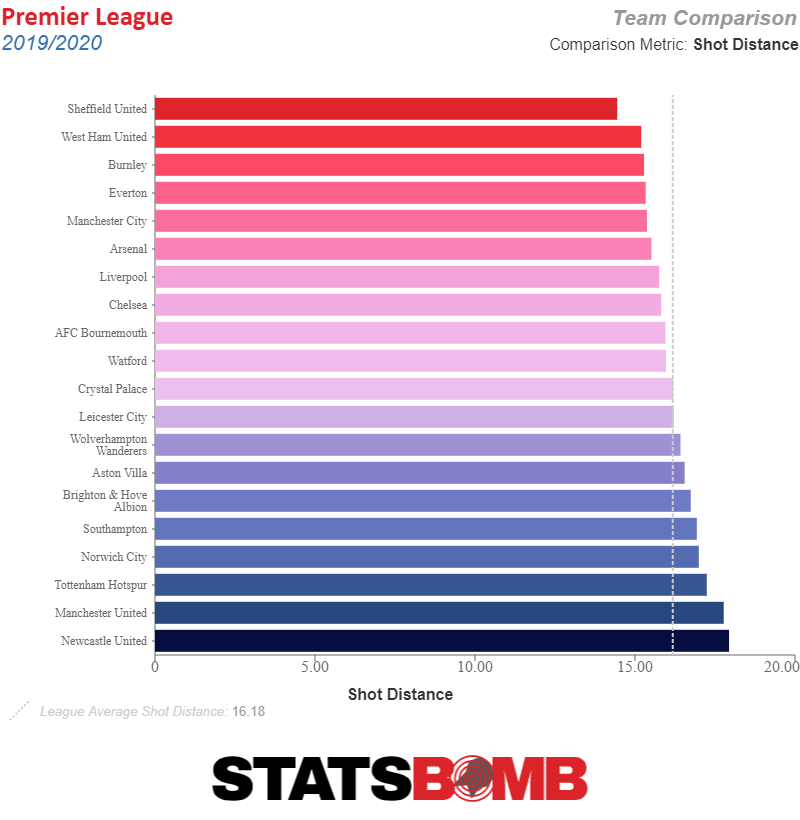 Having a laser-focus on creating quality opportunities negated the fact that they actually took the fewest shots in the league, only adding to the novelty of the Blades’ methods – creating fewer shots than all three relegated sides and the rest is not something you’d associate with a team pushing for European qualification but, unusual though it may be, it did the job. The reason for this ‘low volume / high quality’ aspect of their attacking play is their propensity for crossing both from deep and through combinations to get to the byline. Tough passes to execute but often leading to chances from central areas and close to goal when they did connect. Their wing play and crossing approach was ably supported, of course, by – get your klaxons ready people – the overlapping centre backs. Player of the year Chris Basham’s performances have led to the Bramall Lane stands christening his position the ‘Basham role’, and his pass map from right and central areas in the opposition half highlight how often he got forward to add extra numbers to United’s play in the attacking phase.
Having a laser-focus on creating quality opportunities negated the fact that they actually took the fewest shots in the league, only adding to the novelty of the Blades’ methods – creating fewer shots than all three relegated sides and the rest is not something you’d associate with a team pushing for European qualification but, unusual though it may be, it did the job. The reason for this ‘low volume / high quality’ aspect of their attacking play is their propensity for crossing both from deep and through combinations to get to the byline. Tough passes to execute but often leading to chances from central areas and close to goal when they did connect. Their wing play and crossing approach was ably supported, of course, by – get your klaxons ready people – the overlapping centre backs. Player of the year Chris Basham’s performances have led to the Bramall Lane stands christening his position the ‘Basham role’, and his pass map from right and central areas in the opposition half highlight how often he got forward to add extra numbers to United’s play in the attacking phase. 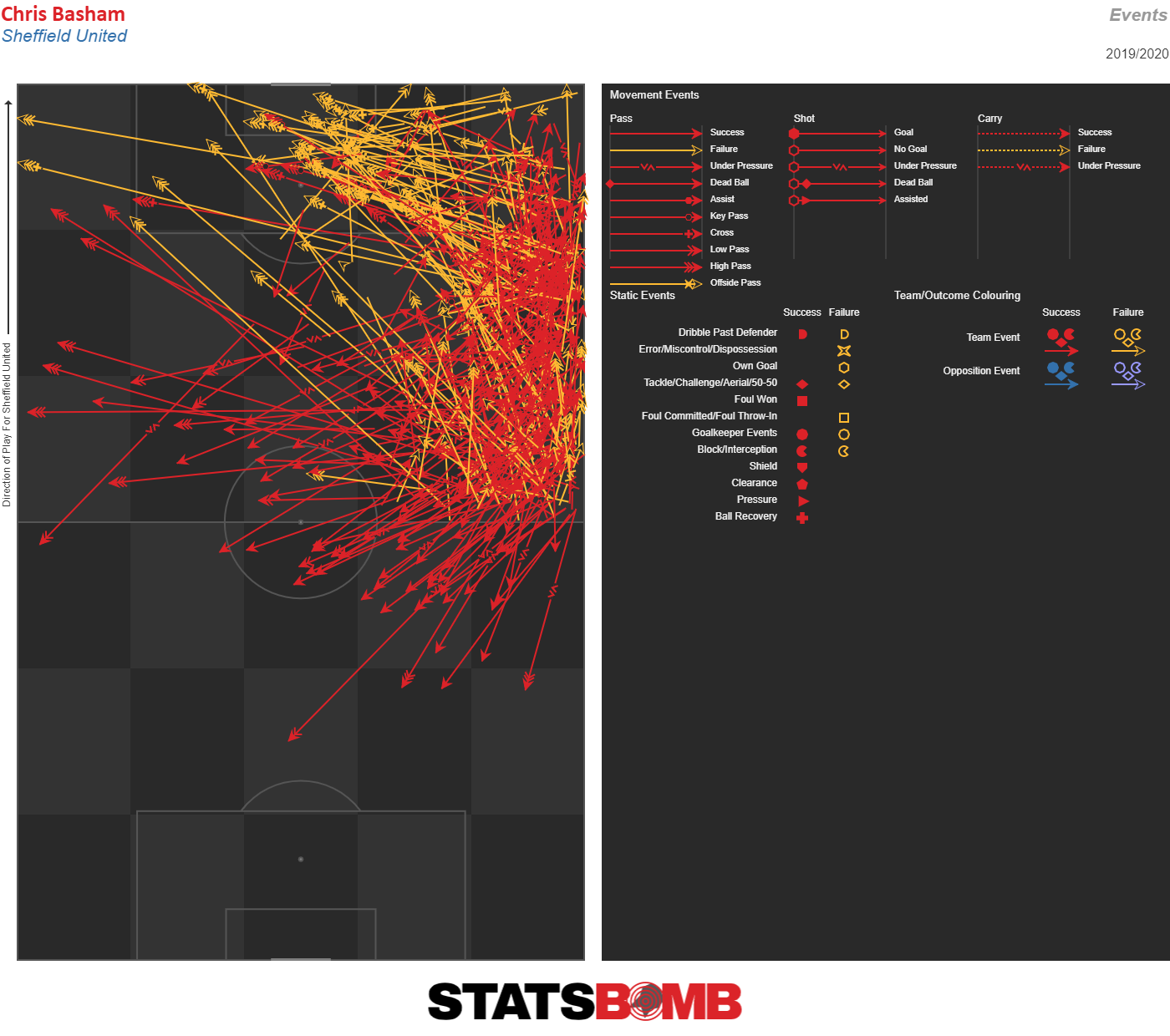 Of course, there’s little reason to focus on their attacking play when it’s the defence that powered the Blades to their lofty finish. Conceding just 39 goals as a newly promoted team, a number bettered only by the eventual top three, takes some doing. Creating openings did not come easy to their opponents, even the “Ferraris”: games against Chelsea, Spurs and Arsenal returned three wins, three draws, no defeats. Three elements forged this Steel City defence. The first was limiting the opportunities their opposition were able to generate, with the sheer number of bodies United would have in the centre of the park both in the defensive and the midfield lines often doing a fine job of congesting that area and forcing the opposition to look for openings elsewhere – the 11.32 shots conceded per game was 8th fewest. Of the sides that had a better record, only Everton finished below them.
Of course, there’s little reason to focus on their attacking play when it’s the defence that powered the Blades to their lofty finish. Conceding just 39 goals as a newly promoted team, a number bettered only by the eventual top three, takes some doing. Creating openings did not come easy to their opponents, even the “Ferraris”: games against Chelsea, Spurs and Arsenal returned three wins, three draws, no defeats. Three elements forged this Steel City defence. The first was limiting the opportunities their opposition were able to generate, with the sheer number of bodies United would have in the centre of the park both in the defensive and the midfield lines often doing a fine job of congesting that area and forcing the opposition to look for openings elsewhere – the 11.32 shots conceded per game was 8th fewest. Of the sides that had a better record, only Everton finished below them. 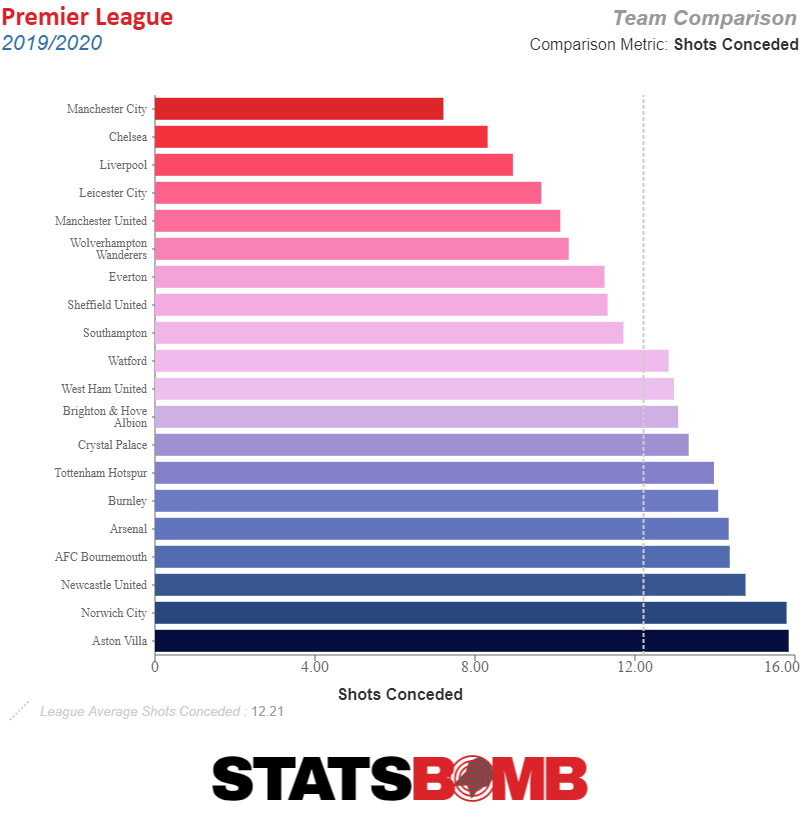 The second element? Dean Henderson. When their opponents did generate a shot, they often found the Manchester United loanee in the sort of form that catapulted him into immediate England contention, earning him a first senior callup in October. Henderson particularly excelled in the old-fashioned arts of goalkeeping: taking pressure off the defence by claiming crosses and making saves that you shouldn’t necessarily expect him to make. Lastly, the Blades performed well on set play’s once again, though this time the acclaim comes on the defensive end, tying with Leicester for the fewest set play goals conceded with 6. When combined, these elements made for a stubborn defence that gave United a reasonable chance of taking a result from virtually every game they played in the 2019/20 season. Unfortunately, Henderson’s form was too good for the decision makers at Old Trafford to ignore and he looks set to compete with David De Gea for the #1 jersey there in 2020/21. Wilder and his recruitment team moved quickly to replace him, spending £18.5 million on bringing Aaron Ramsdale in from relegated Bournemouth. Not far behind Henderson in the England pecking order, Ramsdale will be hoping he can follow in his predecessor’s footsteps and comes with decent pedigree and an upwardly mobile trajectory mirroring that of his new club; capped 26 times in England’s age group squads and also comes in on the back of winning Young Player of the Year at AFC Wimbledon in 2018/19 and Supporters Player of the Year at Bournemouth in 2019/20.
The second element? Dean Henderson. When their opponents did generate a shot, they often found the Manchester United loanee in the sort of form that catapulted him into immediate England contention, earning him a first senior callup in October. Henderson particularly excelled in the old-fashioned arts of goalkeeping: taking pressure off the defence by claiming crosses and making saves that you shouldn’t necessarily expect him to make. Lastly, the Blades performed well on set play’s once again, though this time the acclaim comes on the defensive end, tying with Leicester for the fewest set play goals conceded with 6. When combined, these elements made for a stubborn defence that gave United a reasonable chance of taking a result from virtually every game they played in the 2019/20 season. Unfortunately, Henderson’s form was too good for the decision makers at Old Trafford to ignore and he looks set to compete with David De Gea for the #1 jersey there in 2020/21. Wilder and his recruitment team moved quickly to replace him, spending £18.5 million on bringing Aaron Ramsdale in from relegated Bournemouth. Not far behind Henderson in the England pecking order, Ramsdale will be hoping he can follow in his predecessor’s footsteps and comes with decent pedigree and an upwardly mobile trajectory mirroring that of his new club; capped 26 times in England’s age group squads and also comes in on the back of winning Young Player of the Year at AFC Wimbledon in 2018/19 and Supporters Player of the Year at Bournemouth in 2019/20. 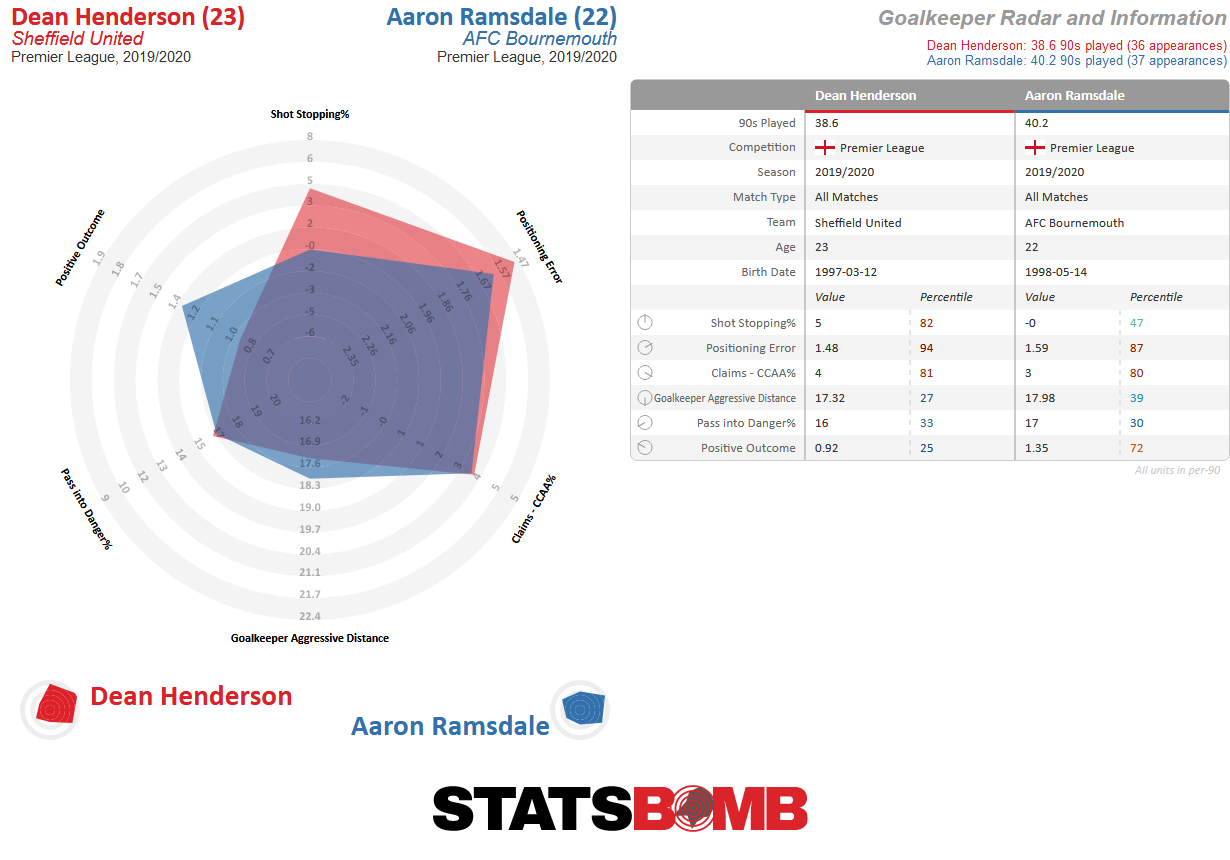 To date, only Wes Foderingham as a backup ‘keeper has followed Ramsdale through the door, but it’s clear that the Blades will be targeting a bit more quality in the middle and top end of the pitch in order to enhance their attacking output. Links with Matty Cash who had an impressive season for Nottingham Forest make sense – the winger-turned-right-back would provide quality in the final third, though the intensity of those links seem to have died down in recent weeks. A deal for Reading’s John Swift would also add some much-needed creativity to the Blades midfield line and could make the difference in games when they’re on top and in search of a breakthrough. Swift’s last two seasons in the Championship have seen him regularly demonstrate his creative capabilities, but he also has a dribbling ability that has been missing from Sheffield United’s arsenal in the last couple of seasons.
To date, only Wes Foderingham as a backup ‘keeper has followed Ramsdale through the door, but it’s clear that the Blades will be targeting a bit more quality in the middle and top end of the pitch in order to enhance their attacking output. Links with Matty Cash who had an impressive season for Nottingham Forest make sense – the winger-turned-right-back would provide quality in the final third, though the intensity of those links seem to have died down in recent weeks. A deal for Reading’s John Swift would also add some much-needed creativity to the Blades midfield line and could make the difference in games when they’re on top and in search of a breakthrough. Swift’s last two seasons in the Championship have seen him regularly demonstrate his creative capabilities, but he also has a dribbling ability that has been missing from Sheffield United’s arsenal in the last couple of seasons. 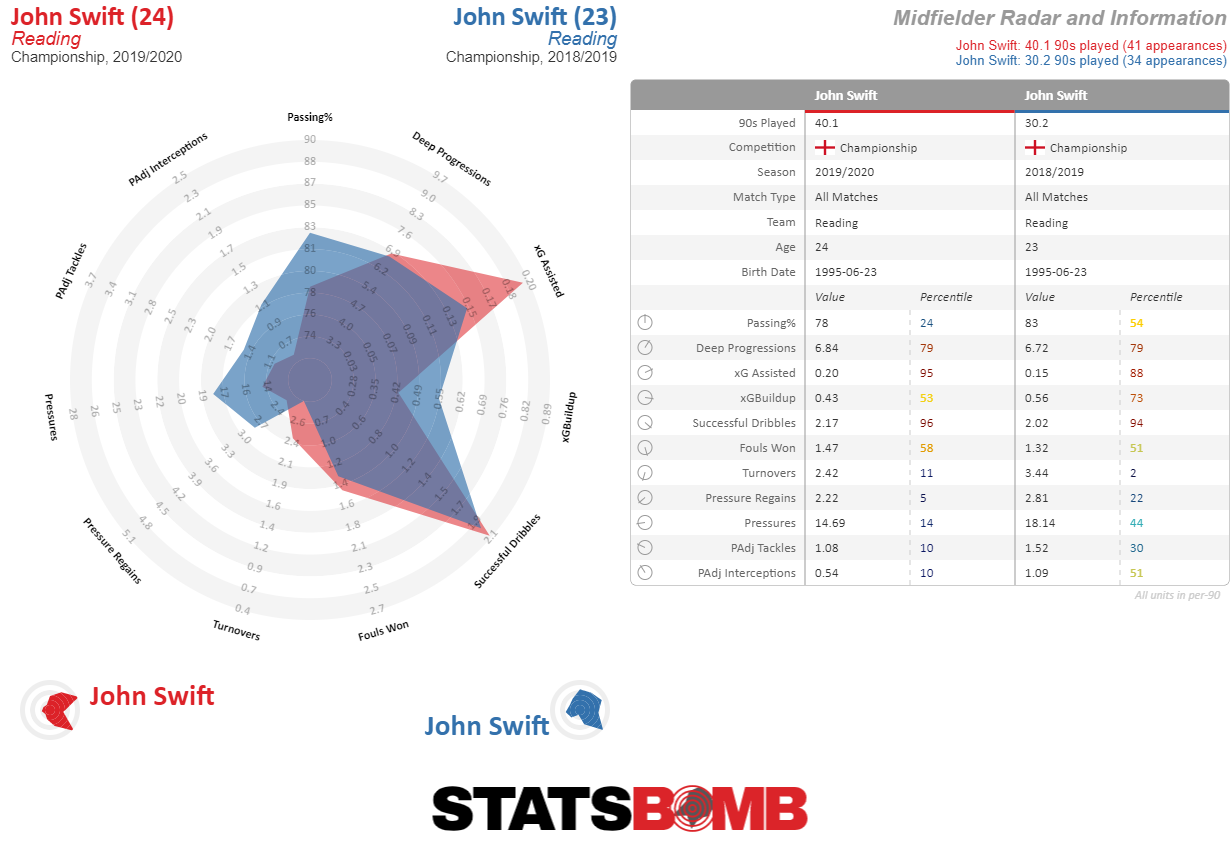 A refresh will also be needed up top soon, if not now. Despite his well-documented finishing issues, David McGoldrick remains a key cog in the Sheffield United frontline for his all-round play but at 32 will need more help and sooner rather than later. Oli McBurnie will be hoping to improve his goal output despite a reasonable first season in red-and-white overall, whilst Lys Mousset sneakily finished the season with 0.67 Goals+Assists per 90 minutes played, but lacked the fanfare due to rarely being able to get on the pitch and lacking the same contribution in other areas of the game that McGoldrick and McBurnie are able to make. Billy Sharp can always be counted on to poach goals but, at 34, isn’t likely to see an increase on the 1134 minutes he played in 2019/20. You can’t help but wonder what would now represent a season of over or underachievement for United given expectation levels are having to realign themselves once again. There’s no two ways about it, the element of surprise has gone and the opposition will know what to expect from them this time around, whilst conceding the 4th-fewest goals in the league will be a tough act to repeat. That said, Wilder will be expecting his attacking players to make a larger contribution to compensate for that and it’s likely that he’ll be challenging his players to go and repeat their achievements now they’ve already proven that it can be done. Repeating or improving on the 9th place finish will undoubtedly be a challenge but you sense that failing to do so may not represent a step backwards for this side anyway. A season of further consolidation may just be the springboard United need in order to hurl themselves through another glass ceiling further down the line.
A refresh will also be needed up top soon, if not now. Despite his well-documented finishing issues, David McGoldrick remains a key cog in the Sheffield United frontline for his all-round play but at 32 will need more help and sooner rather than later. Oli McBurnie will be hoping to improve his goal output despite a reasonable first season in red-and-white overall, whilst Lys Mousset sneakily finished the season with 0.67 Goals+Assists per 90 minutes played, but lacked the fanfare due to rarely being able to get on the pitch and lacking the same contribution in other areas of the game that McGoldrick and McBurnie are able to make. Billy Sharp can always be counted on to poach goals but, at 34, isn’t likely to see an increase on the 1134 minutes he played in 2019/20. You can’t help but wonder what would now represent a season of over or underachievement for United given expectation levels are having to realign themselves once again. There’s no two ways about it, the element of surprise has gone and the opposition will know what to expect from them this time around, whilst conceding the 4th-fewest goals in the league will be a tough act to repeat. That said, Wilder will be expecting his attacking players to make a larger contribution to compensate for that and it’s likely that he’ll be challenging his players to go and repeat their achievements now they’ve already proven that it can be done. Repeating or improving on the 9th place finish will undoubtedly be a challenge but you sense that failing to do so may not represent a step backwards for this side anyway. A season of further consolidation may just be the springboard United need in order to hurl themselves through another glass ceiling further down the line.
If you're a club, media or gambling entity and want to know more about what StatsBomb can do for you, please contact us at Sales@StatsBomb.com We also provide education in this area, so if this taste of football analytics sparked interest, check out our Introduction to Football Analytics course Follow us on twitter in English and Spanish and also on LinkedIn
